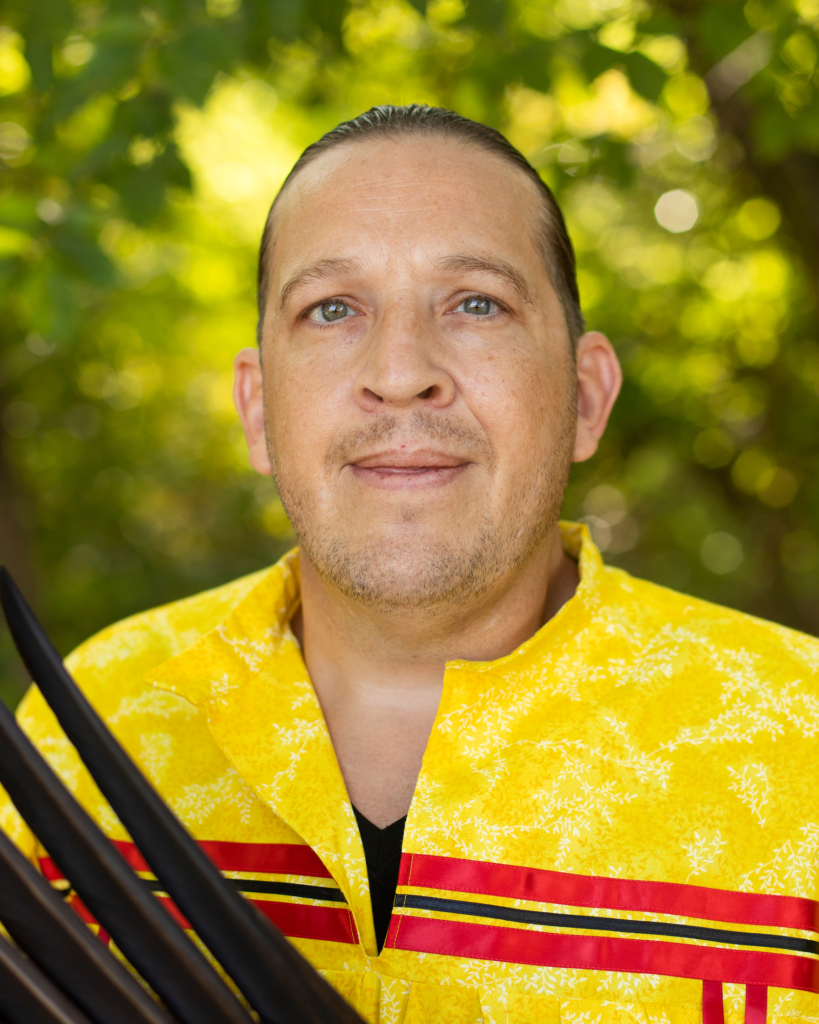In 2022, Citizen Potawatomi Nation received an Administration for Native Americans’ Emergency Native Language Funding Opportunity grant from the U.S. Department of Health and Human Services’ Administration for Children and Families.
The CPN Department of Education and Language Department Language Aide Robert Collins formed the Mokiwek (They Rise) team to offer Bodéwadmimwen to higher education institutions. Collins teaches the course.
“Our aim was to reach out to our people where they are,” he said. “(The Department of Education) approached those colleges that have the most Citizen Potawatomi attending. The ones that receive CPN scholarships.”
CPN now has agreements with four colleges and universities in Oklahoma and one in Kansas — East Central University in Ada, Oklahoma City Community College, University of Central Oklahoma in Edmond, Rose State College in Midwest City and Kansas State University in Manhattan, Kansas.
Collins assists five students, one of whom is a CPN tribal member. He dedicated himself to the project and students looking to improve their literacy skills.
Curriculum
The class utilizes a web-based digital platform called Tovuti. It allows the students to learn the same material each week despite geographic distance. Collins is available for questions and help as well.
“We’ve pretty well maintained a good relationship with (the students) because we do have them introduce themselves, and we were able to have them submit a video introducing themselves (in Potawatomi) from the introduction lesson that we gave them, and they did a great job, exceeding our lesson outcomes,” he said.

Collins helped craft appropriate language materials that met the syllabus created by the Mokiwek team and accepted by the institutions and began serving higher education students through new platform in fall 2022.
It starts at the very beginning with the basics of Bodéwadmimwen, and any student can succeed regardless of their prior exposure to the language. The class focuses on grammar and vocabulary with accurate, relevant content that challenges the students.
“If it takes longer to learn it, it takes longer to learn it, kind of thing,” Collins said. “I don’t keep anything from them. If I can learn it, you can learn it.”
Collins and the Department of Education built the class around the Potawatomi worldview in sequence with the medicine wheel and the four seasons — mnokme (spring), niben (summer), dgwaget (fall) and bbon (winter). The students also read sections of Jim Thunder, Sr.’s Mikwéndëwnen: Memories, which features stories from a bilingual Potawatomi elder and first language speaker.
“We wanted them to utilize his book for the good stories written from a first language speaker,” Collins said. “And so, it’s pretty easy to go and read the Potawatomi.”
The class also includes cultural teachings and utilizes offerings from the Citizen Potawatomi Nation Cultural Heritage Center, including videos and the 3D interactive tour of the museum available on the CHC website (potawatomiheritage.com). Students write a short children’s book for their final project to be used in language classes at the Citizen Potawatomi Nation Child Development Centers. In doing so, they add to the language revitalization efforts.
“We have to give them the tools that they need (to complete their final), and I’ve introduced them into a lot of little stories, just so they can get the concept down,” Collins said.
The students enjoy the class’s flexible platform, and Collins expects them to show self-sufficiency and self-motivation. For him, the course comes with the chance to expand educational opportunities.
“We want to be at a certain level of academics with our language, and that requires us to hold ourselves to a certain standard. Once we’re at that level … it makes you want to move to the next level,” Collins said.
The Mokiwek team will return with their Potawatomi 1 language course at colleges and universities in fall 2023. They anticipate offering Potawatomi 2 in spring 2024. Find more information about the higher education course by emailing education@potawatomi.org.
